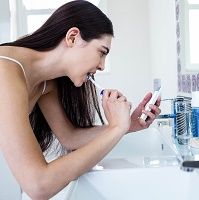'Selfies' May Help Patients Improve Their Oral Health Care Techniques
A small study in India looked at whether the camera feature on smartphones could be used to help people improve their tooth-brushing technique.

We see them every day: people using smartphones to take “selfies” they can share with their social networks. But instead of taking these pictures to show off a new haircut or capture a visit to their favorite vacation spot, what if people used selfies to evaluate their own dental care techniques? In a small pilot study, researchers in India used smartphone video selfies to see if tooth brushing techniques could be improved in a volunteer patient population.
Tooth brushing is the most widely used form of oral hygiene. Since tooth brushing techniques are usually taught from a very early age, any problems people have with their brushing methods can be hard to correct. Even if patients are re-educated on technique during visits to their dentist, it’s likely that they will fall back into the same poor patterns of tooth brushing once they’re home.
Since almost everyone has a smartphone now, researchers wanted to study whether they could be used to help patients identify and correct improper tooth brushing techniques once they were away from their dentists. Four dental student intern volunteers were chosen to participate in the study. Each volunteer was trained to use their own smartphone to capture video selfies while brushing their teeth, making sure to include in the video their brushing hand, mouth, toothbrush, and toothbrush bristles. Participants were asked to record their entire tooth brushing routine as they’d regularly perform it.
At the start of the study, one baseline video selfies was recorded for each patient on-site at the research facility. For each study volunteer, a total of five videos were analyzed. The research team noted a modest increase in the accuracy of tooth brush strokes for each volunteer, and there was an increase in the number of strokes overall. However, the length of time that each person spent brushing their teeth did not increase at all.
Since the effectiveness of tooth brushing has previously only been measured by patients’ self-reported behavior, indirect measures such as tooth wear, and clinical outcomes, the study researchers hope that new approaches to dental care — like selfie videos – could be used by dentists to promote more active patient participation in their own oral health care.
Using selfie videos to actively involve patients could increase patient motivation to do a good job brushing and might help patients stick with new tooth brushing techniques their dentists recommend. Patients might also be more aware of the techniques they’re using and choose to correct those techniques after viewing the videos of themselves. The study researchers hope that dental selfies could be used as a tool to help dentists reinforce proper tooth brushing methods and while also evaluating improvements provided to patients.